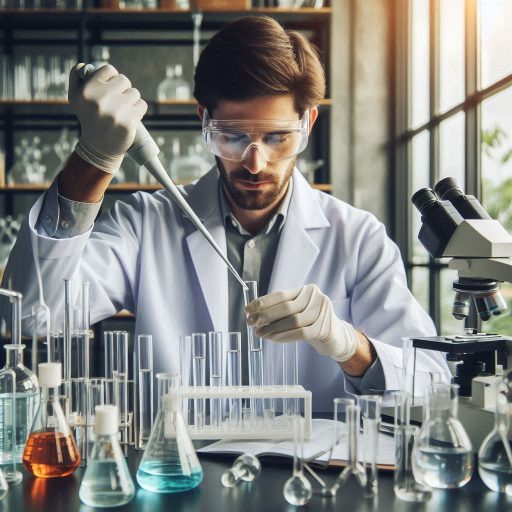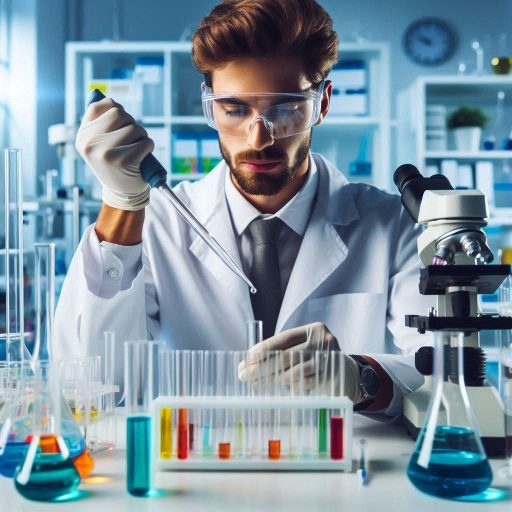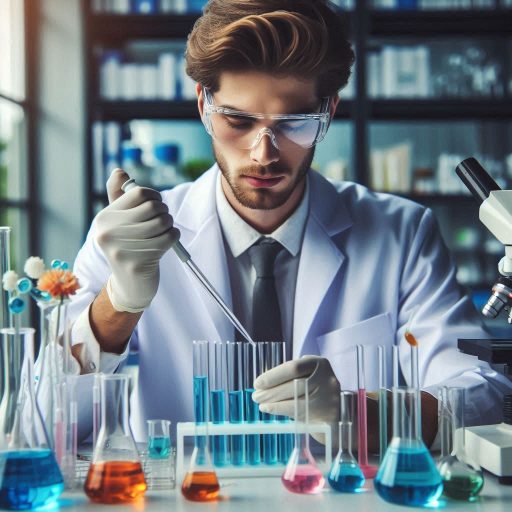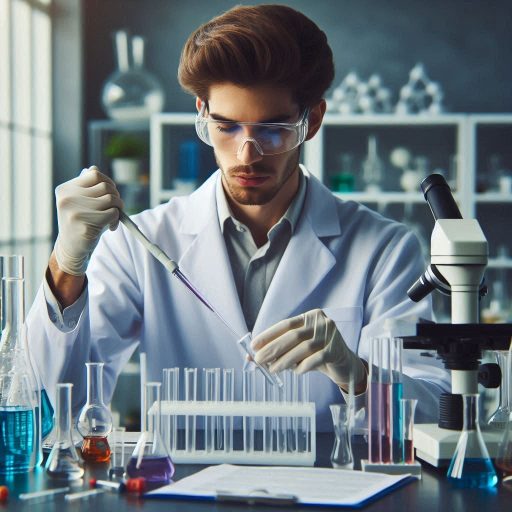Introduction
Laboratory technicians play a crucial role in the medical and scientific fields.
They are responsible for conducting various tests and experiments that provide essential data for diagnoses, research, and development.
Their work ensures the accuracy and reliability of results, which is vital for making informed decisions in healthcare and other scientific domains.
As the demand for precision in these fields grows, the need for specialized laboratory technicians has become increasingly important.
Brief Overview of Laboratory Technician Roles
Laboratory technicians are involved in a wide range of tasks, from preparing samples to operating sophisticated equipment.
They work under the supervision of laboratory managers or scientists and are tasked with following strict protocols to ensure the validity of their results.
These professionals must be meticulous, detail-oriented, and capable of working with complex instruments.
Their duties often include collecting and analyzing samples, maintaining laboratory equipment, and ensuring that safety standards are met.
The role of a laboratory technician is integral to the functioning of a lab, as their work supports critical processes in research, diagnostics, and development.
Importance of Specializations in the Field
The field of laboratory technology is vast and diverse, with numerous areas requiring specialized knowledge.
Specializations allow laboratory technicians to focus on specific types of tests or procedures, enhancing their expertise in those areas.
This focus not only increases the accuracy of the work performed but also improves efficiency.
Specialized technicians are often more adept at handling complex procedures, as they have in-depth knowledge and experience in their chosen area.
For example, a technician specializing in microbiology would be highly skilled in identifying and analyzing microorganisms, which is crucial for diagnosing infections and developing treatments.
Specialization also opens up more career opportunities for laboratory technicians.
As technology advances and new methods are developed, the demand for technicians with specialized skills continues to rise.
Employers often seek out those who have expertise in particular areas, as they can bring added value to the organization.
In addition, specialized technicians are more likely to be involved in cutting-edge research and development projects, where their skills are essential for success.
In addition, the role of a laboratory technician is crucial to the success of medical and scientific endeavors.
Specializations within this field enhance the precision and efficiency of laboratory work, providing numerous benefits to both the technician and the broader scientific community.
As the demand for specialized skills continues to grow, laboratory technicians with expertise in specific areas will play an increasingly important role in advancing science and healthcare.
Clinical Laboratory Technicians
Description of Duties
Clinical laboratory technicians play a crucial role in healthcare settings.
They are responsible for conducting tests and procedures that help doctors diagnose and treat patients.
Their duties include collecting samples, analyzing bodily fluids, and identifying abnormalities in test results.
Technicians use specialized equipment to perform these tasks, ensuring that the results are accurate and reliable.
They must also maintain detailed records of their findings and report them to healthcare professionals.
These tasks require precision and attention to detail, as any error can impact patient care.
Specializations Within Clinical Laboratory Work
Clinical laboratory technicians can specialize in various areas, allowing them to focus on specific types of tests and procedures.
Some may choose to specialize in microbiology, where they identify and study microorganisms like bacteria and viruses.
Others might focus on hematology, which involves analyzing blood samples to detect diseases such as anemia or leukemia.
Another specialization is immunology, where technicians study the immune system and conduct tests related to allergies and autoimmune diseases.
Each specialization requires in-depth knowledge of the specific field and the ability to work with specialized equipment.
Certification Requirements
Certification is a vital aspect of a clinical laboratory technician’s career.
While some states do not require certification, it is often preferred by employers and can enhance job prospects.
To become certified, technicians must complete an accredited laboratory technician program and pass a certification exam.
The American Society for Clinical Pathology (ASCP) offers one of the most recognized certifications in the field.
Certification demonstrates a technician’s competence and commitment to maintaining high standards in their work.
It also requires continuing education to stay updated with advancements in laboratory technology and practices.
Read: Top Surveying and Mapping Technician Employers
Medical Laboratory Technicians
Medical laboratory technicians play a crucial role in the healthcare system.
They are responsible for performing various laboratory tests that help doctors diagnose, treat, and prevent diseases.
These technicians work in a variety of settings, including hospitals, clinics, research laboratories, and forensic laboratories.
Distinction from Clinical Laboratory Technicians
It is essential to understand the difference between medical laboratory technicians and clinical laboratory technicians.
While they both work in the laboratory setting, their roles are distinct.
Medical laboratory technicians typically focus on analyzing body fluids, tissues, and other specimens to assist healthcare providers in diagnosing and treating patients.
On the other hand, clinical laboratory technicians mainly perform routine laboratory procedures and tests, such as blood tests and urine tests.
Common Specializations in Medical Laboratory Work
- Clinical Chemistry: Technicians specializing in clinical chemistry analyze blood, urine, and other body fluids to measure the levels of various substances, such as glucose, cholesterol, and electrolytes.
They play a vital role in diagnosing and monitoring various medical conditions, such as diabetes and kidney disease. - Microbiology: Microbiology technicians focus on studying microorganisms, such as bacteria, viruses, and fungi.
They perform tests to identify and characterize these organisms, helping healthcare providers determine the appropriate treatment for infections. - Hematology: Hematology technicians analyze blood samples to evaluate the number, type, and quality of blood cells.
They play a crucial role in diagnosing blood disorders, such as anemia, leukemia, and clotting disorders. - Immunology: Immunology technicians study the body’s immune system and its response to various diseases.
They perform tests to detect antibodies, antigens, and other immune system components, helping healthcare providers diagnose autoimmune disorders, allergies, and infectious diseases. - Cytotechnology: Cytotechnology technicians examine cells under a microscope to detect abnormalities that may indicate cancer or other diseases.
They play a critical role in cancer diagnosis and screening.
Educational Background Needed
Before pursuing a career as a medical laboratory technician, individuals must meet certain educational requirements.
Typically, a high school diploma or equivalent is required to enroll in a medical laboratory technician program.
These programs are offered at vocational schools, community colleges, and universities and usually take 1-2 years to complete.
Additionally, some employers may require certification or licensure, which can be obtained through organizations such as the American Society for Clinical Pathology (ASCP) or the National Credentialing Agency for Laboratory Personnel (NCA).
Medical laboratory technicians must also possess certain skills and qualities to succeed in their profession.
These include attention to detail, critical thinking, manual dexterity, and the ability to work well under pressure.
Additionally, good communication skills are essential, as technicians often need to collaborate with other healthcare professionals to ensure accurate and timely test results.
Read: Safety Tips for Field Surveying Technicians
Research Laboratory Technicians
Responsibilities in a research setting
- Preparing and setting up equipment for experiments
- Collecting samples and conducting tests under the supervision of scientists
- Recording and analyzing data obtained from experiments
- Assisting in the development and implementation of research methodologies
Specializations in areas such as microbiology or genetics
Research laboratory technicians can specialize in specific areas of study to enhance their expertise and knowledge. Some common specializations include:
- Microbiology: focusing on studying microorganisms like bacteria, viruses, and fungi
- Genetics: analyzing genetic materials and conducting experiments related to heredity
- Immunology: specializing in the study of the immune system and related diseases
- Biotechnology: working on research projects involving the application of biological systems
Skills and knowledge required
Research laboratory technicians need a combination of technical skills and knowledge to excel in their roles.
Some essential requirements include:
- Strong attention to detail and accuracy in conducting experiments
- Good communication skills to work effectively with scientists and other team members
- Knowledge of laboratory safety procedures and practices
- Ability to operate and maintain laboratory equipment efficiently
- Understanding of scientific principles and research methodologies
Overall, research laboratory technicians play a vital role in advancing scientific knowledge and contributing to breakthroughs in various fields of study.
Read: Recent Trends in Surveying and Mapping Technologies
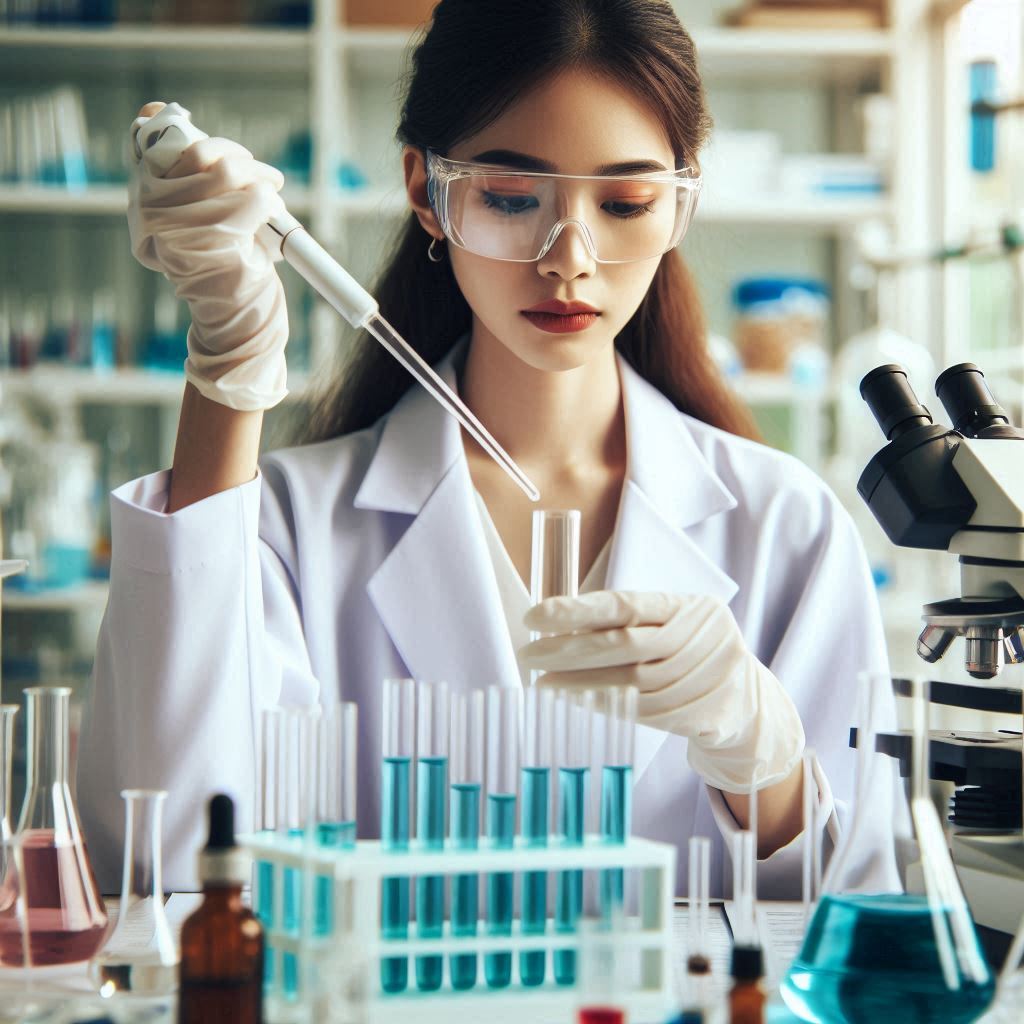
Discover More: Guide to Cybersecurity Analyst Continuing Education
Environmental Laboratory Technicians
An environmental laboratory technician plays a crucial role in environmental science and analysis.
This specialized field focuses on monitoring and analyzing various environmental factors to ensure regulatory compliance and protect public health.
Role in Environmental Science and Analysis
- Environmental laboratory technicians are responsible for collecting samples from the environment, such as water, soil, or air, and analyzing them to identify pollutants or contaminants.
- They use specialized equipment and techniques to perform tests that measure the levels of pollutants in the environment, helping scientists and policymakers make informed decisions about environmental protection and remediation.
- These technicians play a key role in monitoring environmental changes over time, detecting trends in pollution levels, and assessing the effectiveness of environmental regulations and policies.
Specializations in Areas Like Water Quality or Air Pollution
- Environmental laboratory technicians can specialize in areas such as water quality, air pollution, hazardous waste management, or ecology, depending on their interests and career goals.
- Those who focus on water quality may work on projects related to drinking water safety, wastewater treatment, or marine pollution, while technicians specializing in air pollution may analyze emissions from industrial or transportation sources.
- Specializing in a specific area allows technicians to develop expertise in their field and contribute to solving complex environmental challenges through research and analysis.
Regulatory Standards in This Field
- Environmental laboratory technicians must adhere to strict regulatory standards set by government agencies, such as the Environmental Protection Agency (EPA) or the Occupational Safety and Health Administration (OSHA).
- They follow standardized procedures for sample collection, analysis, and reporting to ensure the accuracy and reliability of their findings, as well as compliance with environmental regulations.
- Technicians also stay informed about changes in environmental laws and regulations to adapt their practices and procedures accordingly, helping to protect the environment and public health.
Read: Networking Tips for Surveying and Mapping Professionals
Uncover the Details: Developing Soft Skills as an IT Support Specialist
You Might Also Like: Biomedical Engineering: Role in Telemedicine
Transform Your Career Today
Unlock a personalized career strategy that drives real results. Get tailored advice and a roadmap designed just for you.
Start NowForensic Laboratory Technicians
Forensic laboratory technicians play a crucial role in criminal investigations.
They analyze evidence collected from crime scenes, providing vital information that helps solve cases.
Their work is essential for ensuring justice is served.
Unique Tasks Within Forensic Science
Forensic laboratory technicians are responsible for various tasks that require precision and expertise.
They collect, analyze, and document evidence such as blood samples, hair, fibers, and other trace materials.
Their work often involves using advanced laboratory equipment to conduct tests that identify substances, match DNA profiles, and analyze ballistic evidence.
These tasks are unique to forensic science because they directly contribute to understanding how crimes were committed and identifying those responsible.
Technicians must meticulously follow protocols to preserve the integrity of the evidence, ensuring it can be used in court.
The ability to perform these tasks with precision and reliability is critical for the overall success of criminal investigations.
Specializations in Areas Like DNA Analysis or Ballistics
Forensic laboratory technicians often specialize in specific areas of forensic science, allowing them to focus on particular types of evidence.
DNA analysis is one such specialization.
Technicians in this field work on extracting and analyzing DNA from samples collected at crime scenes.
They compare these DNA profiles with known samples, which can be instrumental in identifying suspects or victims.
Another important specialization is ballistics, where technicians analyze firearms, bullets, and gunpowder residues.
Their work helps determine the type of weapon used and trace the trajectory of bullets, which can be crucial in reconstructing crime scenes.
These specializations require in-depth knowledge and training, as the accuracy of their findings can significantly impact the outcome of criminal cases.
Technicians must stay updated with the latest advancements in their field to maintain high standards of analysis.
Importance of Attention to Detail and Accuracy
In forensic science, attention to detail and accuracy are paramount.
Forensic laboratory technicians must ensure every piece of evidence is handled with utmost care to prevent contamination or loss.
Even the smallest mistake can lead to incorrect conclusions, which could affect the justice system.
Accurate documentation is equally important, as it provides a clear record of the evidence and the procedures followed during analysis.
This documentation must be precise and thorough, as it is often used in court to support the findings.
Forensic laboratory technicians must also be vigilant in their work, constantly verifying their results to ensure they are accurate.
The stakes are high in forensic science, and the importance of accuracy cannot be overstated.
Technicians’ commitment to detail and precision ensures that their contributions to criminal investigations are reliable and trustworthy, ultimately aiding in the pursuit of justice.
Conclusion
Recap of the Importance of Specializations in Laboratory Technician Roles
Specializations in laboratory technician roles are crucial for both professionals and the healthcare industry.
As medical science advances, the demand for specialized knowledge increases.
Laboratory technicians who focus on specific areas like hematology, microbiology, or molecular diagnostics bring expertise that enhances patient care.
This specialization allows technicians to handle complex tests, leading to more accurate diagnoses.
Specializations also make technicians indispensable in research and development, contributing to innovations in medical treatments.
In essence, specializing helps laboratory technicians stay relevant and excel in their careers while significantly impacting the healthcare system.
Encouragement for Individuals Considering a Career in the Field
For those considering a career as a laboratory technician, specialization offers a clear path to success.
By choosing to focus on a specific area, you can develop a deep understanding of that field, setting yourself apart from others.
Specializations not only enhance your job prospects but also increase job satisfaction.
The more skilled and knowledgeable you are, the more you can contribute to patient outcomes and medical advancements.
Whether you‘re interested in genetics, clinical chemistry, or pathology, there‘s a specialization that aligns with your passion.
Final Thoughts on the Diverse Opportunities Available for Specialization
The field of laboratory technology is vast and filled with diverse opportunities for specialization.
As healthcare continues to evolve, new specializations will emerge, offering even more career paths.
Whether you‘re just starting or looking to advance, the chance to specialize can transform your career.
From working in hospitals and research labs to pharmaceutical companies and public health organizations, specialized laboratory technicians are in high demand.
[E-Books for Sale]
The Big Book of 500 High-Paying Jobs in America: Unlock Your Earning Potential
$19.99 • 500 High-Paying Jobs • 330 pages
Explore 500 high-paying jobs in America and learn how to boost your career, earn more, and achieve success!
See All 500 High-Paying Jobs of this E-Book
1001 Professions Without a Degree: High-Paying American Jobs You Can Start Now
$19.99 • 1001 Professions Without a Degree • 174 pages
Discover 1001 high-paying jobs without a degree! Unlock career tips, skills, and success strategies for just $19.99!

